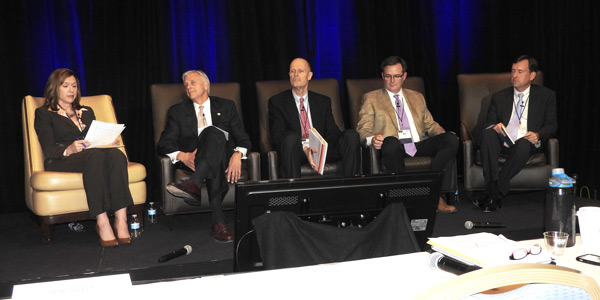By Rory D. Sweeney
PHILADELPHIA — More than 200 stakeholders met at the Philadelphia Airport Marriott on Wednesday and others listened in on the webcast to discuss the meaning of resiliency and reliability on the electricity grid and how to incentivize enhancement of it through PJM’s electricity markets.
PJM Grid 20/20: Focus on Resilience included 16 speakers and featured three panels that slowly built toward a discussion of solutions with the final speakers. However, clear solutions seemed to remain elusive.
“The only way we can properly design the market, the only way we can ensure reliability is through conversations like this: What’s happening, how do we need to change, how do we need to adapt and are we comfortable with where things are going?” said Bill Berg, Exelon Generation’s eastern RTO director. “I said, ‘that was my only firm, concrete solution.’”
Independent Market Monitor Joe Bowring moved the ball forward by suggesting what those conversations should entail.
“We need to define analytically the detailed meaning of resilience,” he said. “What are the metrics?”
Beyond that, speakers largely identified issues and what shouldn’t be done.
“Here’s what we shouldn’t do,” Bowring said. “We shouldn’t pick winning technologies; we shouldn’t provide nonmarket competition for preferred technologies; we shouldn’t make fundamental changes to the market to accommodate preferred answers.”
His answer touched on a consistent battleground during the discussions about whether noneconomic baseload generators should be retained if they provide other benefits. The issue is particularly timely given the zero-emissions credit subsidies approved in Illinois and New York to preserve in-state nuclear plants.
Berg, whose company’s nuclear units are the beneficiary of both of those subsidies, urged stakeholders to consider whether the markets are designed correctly if such out-of-market measures are necessary to preserve the grid’s nuclear fleet. Supporters have argued that ZECs would not be necessary if the markets incorporated the cost of carbon emissions from fossil fuel plants.
“While it’s simple to say, ‘Let’s just rely on markets,’ there’s a reality that we need to recognize as part of the conversation as we transition to a fully competitive market,” he said. “We’re not there yet.”
Bowring argued that the purpose of the markets is to determine whether such plants are indeed desirable.
“The term baseload, think about it: What does that mean?” he said. “A baseload unit was a unit that used to be economic and isn’t anymore, but we still want it to be so let’s make it economic by giving it subsidies.”
Other speakers urged cooperation among all stakeholders to solve the issues.
“This is not an issue that is just left in each of the silos, whether it’s PJM, or it’s a state regulator, or it’s the industry or if it’s one of you companies to try and find solutions,” said Richard Mroz, president of both the New Jersey Board of Public Utilities and the Organization of PJM States Inc. “It is really incumbent upon all of us to do it. … State regulators don’t have the answers. People think we do. We don’t even have a real semblance of that ability as we did to deal with integrated resource plans.”
Joining Bowring, Mroz and Berg on the final panel was Calpine’s Andrew Novotny, who reminded the audience that out-of-market subsidies have impacts that can hurt the market’s overall purpose.
“If we do use state subsidies in order to preserve nuclear plants when they become uneconomic, it’s critical that PJM protects the capacity market and has a price that is protected from what that impact would be,” he said. “There will be a consequence if that’s not done. … We rely on the Capacity Performance product in order to provide revenues that we desperately need to maintain our fuel-oil backup.”
Calpine has oil backup for about 5,000 MW of its natural gas-fired generation to address its CP responsibilities, he said.
Direct Energy’s Marji Philips asked the panelists why proposed solutions continue to cling to previous market structures.
“Everybody’s talking about the past, and putting Band-Aids on the past, instead of looking [at] what’s going to be a very radical future that we can’t imagine today,” she said.
Bowring said the purpose of markets is to define needs and incentivize creative solutions.
“I would say there is no defined market-design problem that requires subsidies as a solution, particularly for specific uneconomic resources,” he said. “One of the things that underlies this whole discussion is an underlying tension between the exogenous requirement to be reliable, NERC-imposed, FERC-imposed and the existence of markets. Markets have successfully met the reliability standards so far, and my point is I think they can continue to do that, but there is that tension. There has always been that tension. The fact that we’re talking about resilience doesn’t make that tension new. It simply makes the challenges more difficult. We need to now think in even more detail about what reliability really means when we include resilience in the definition.”
Mroz warned that state regulators can’t be left to define needs for the market either. For example, he said the BPU is sometimes the last to know about distributed energy resources interconnecting to the grid.
“We don’t have the tools anymore at the state level to identify where all those resources are,” he said. “Something that I have been very vocal about is to ask PJM to ask the industry to be mindful that in the context of meeting these challenges, we’re also mindful at the end of the day of the cost impact that ultimately has to be borne by the consumer.”




